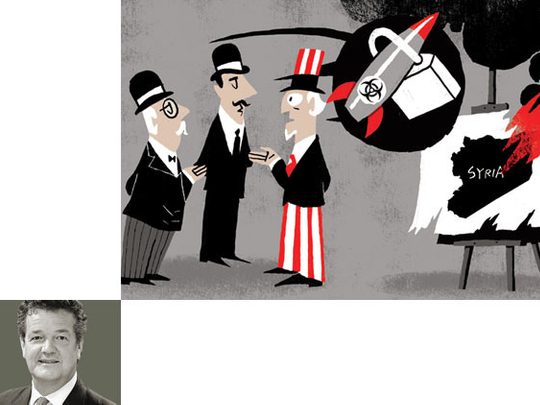
The surprise move to find a diplomatic solution to the international community’s anger over Syrian chemical weapons should not be allowed to cover up its failure to find a political solution to the civil war. For more than two years, hundreds of thousands of people have been killed and millions made refugees and the world’s great powers have done nothing. They have argued that it was too complicated and too dangerous to intervene, while Syria collapsed into chaos.
Nonetheless, it seems likely that the US is ready to agree to a political deal with the Syrian government over its chemical weapons after three weeks of bizarre political confusion and the French and Russians are already arguing about the terms of a United Nations resolution to support the deal.
However, this diplomacy is new. After more than 1,400 people were killed in a gas attack by the Syrian government on August 21 in a suburb of Damascus, US President Barack Obama, British Prime Minister David Cameron and French President Francois Hollande were clear that the “red line” had been crossed and military intervention was required.
All were ready to take an executive decision and unleash missiles on Syria to degrade the government’s military capacity, even if they failed to offer any idea about what would happen after they rained down destruction on Syrian military bases. As a result, the British parliament rejected Cameron’s arguments and refused to permit him to take Britain to war, a result which caught both Labour and Conservatives by surprise.
A bellicose Obama then announced he would seek the support of Congress for limited military action against the Syrian government focused on the chemical weapons. In order to find enough votes to get this through, he even went so far as to agree to arm the rebels to meet the demands of the Republican hawks, lead by Senator John McCain who was then happy to announce that he would support the president’s motion.
So it was a shock on Monday when US Secretary of State John Kerry told the press in London that US strikes may be prevented if Bashar Al Assad was to “turn over every single bit of his chemical weapons to the international community in the next week”. This idea was certainly not part of Obama’s warlike dialogue with Congress and the State Department officials first described this as a gaffe and dismissed the idea as a rhetorical notion, but Russian Foreign Minister Sergei Lavrov welcomed the comments and made clear that Russia would use its influence with Al Assad to make it happen.
By the end of Monday, the vote in the Senate on Syria scheduled for yesterday had been delayed and Obama had welcomed both Kerry’s idea as well as the Russian response, calling it a “potentially positive development” as he “overwhelmingly preferred” a diplomatic resolution to the current crisis. The French Foreign Minister, Laurent Fabius, said he would present a resolution at the UN Security Council calling on the Syrian government to cede its chemical weapons to international control.
By Tuesday, the Syrians had agreed to the Russian idea, the French were drafting a tough resolution requiring Syria to hand over all its chemical weapons to international control and to agree to international supervision. The Arab League had backed the new move, saying that it had always wanted a political answer. Yesterday, the French and Russians were arguing over the terms of a UN resolution.
An impossible stretch
However, this surprise shift to an apparent international deal over Syrian chemical weapons is not dealing with the main problem, which is the continuing civil war in Syria. It is an impossible stretch to agree with Obama’s comment that finding a solution to the chemical weapons issue lays the ground work for a wider political answer.
Bitter confusion reigns in Washington, Paris and London as the West’s political leaders struggle to find a policy to deal with Syria. The international community is hiding behind its commitment to the Geneva Process under which it says it will support a negotiated political solution to the Syrian civil war, seeking an inclusive interim government supported by all parties. But the same people have been clear that after shooting a large number of his own people in his struggle to retain power, Al Assad has lost his political legitimacy and should leave office.
It has not been obvious how either of these two policies were going to be implemented and as a result the American and British leaders have floundered their way through two-and-a-half years of neglect of Syria as more than 100,000 people have died and millions been made refugees. Significant humanitarian efforts have been made to look after the increasingly desperate refugees, but little has been done to address the political causes of the war.
The international community and Syria’s regional friends need to build a forum in which Syrian generals and the secular opposition can find common cause to rebuild Syria and keep dangerous radicals like Hezbollah and Al Qaida allies Jabhat Al Nusra out of the political process. If they fail to find common cause, they may be overwhelmed by the vicious militancy of groups who do not seek greater good, but want to grab power for themselves.









